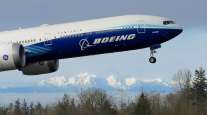Bloomberg News
Boeing Max Disasters Spur Senate Bid to Toughen New-Jet Rules

[Ensure you have all the info you need in these unprecedented times. Subscribe now.]
A Senate bill introduced June 16 calls for more government oversight of aircraft certification in reaction to a pair of Boeing Co. 737 Max crashes.
The bipartisan legislation would address concerns about a controversial system in which plane-makers such as Boeing are able to use their own employees to at least partially certify designs, leaders of the Senate Commerce Committee said in announcing the measure.
It would require more direct oversight by the Federal Aviation Administration of plane-makers. The issue has been central to the two crashes that killed 346 people off the coast of Indonesia and in Ethiopia in 2018 and 2019.

COVID-19 has placed significant strain on many freight networks. So how are third-party logistics providers adapting to meet these challenges? Host Seth Clevenger chats with two 3PL executives who have had firsthand experience contending with this crisis. Hear a snippet, above, and get the full program by going to RoadSigns.TTNews.com.
The bill was introduced by Sen. Roger Wicker, the Mississippi Republican who is chairman of the committee, and Sen. Maria Cantwell of Washington, the committee’s highest ranking Democrat.
“Safety is paramount,” said Cantwell in a news release. “A primary goal of this legislation is to make sure the FAA remains in the driver’s seat when it comes to certification.”
Wicker said the legislation “would take important steps to improve safety, especially as it relates to the manufacturing of passenger aircraft.”
RELATED: Boeing, Suppliers Plung on Stop-And-Go 737 Max Comeback
Both planes crashed after a software system malfunctioned, prompting repeated automated attempts to dive. While there were ways to bypass the system, pilots became confused and Boeing has been criticized in accident reports for failing to predict how pilots would react.
While FAA engineers signed off on an earlier version of the system implicated in the crashes, Boeing later made it more powerful and the final designs were approved by its own employees. Boeing’s employees were still required to follow federal regulations and FAA had authority to override them.
The Senate legislation would require FAA approval of any Boeing employees appointed in the unit that reviews designs, which doesn’t typically occur today. There are also restrictions limiting how FAA engineers can communicate with Boeing’s certification workers, and the bill would strike down such limits.
Separately, the bill would require makers of airliners and their jet engines to implement so-called safety management systems to identify and mitigate potential hazards. These programs require internal safety audits, robust reporting to regulators and more direct involvement of top managers.
RELATED: Boeing Begins Cutting Workforce With 6,770 Layoffs in US
Such programs are required at airlines, but there’s no such requirement for manufacturers such as Boeing.
The bill would also require the FAA to reassess the underlying assumptions about how pilots interact with aircraft systems when the agency reviews the safety of new planes, especially how fight crews respond to multiple cockpit alerts and automated flight control systems. Earlier examinations of the FAA’s approval of the 737 Max found the agency and Boeing misjudged how quickly pilots would react to the situation that occurred in both crashes of the jet.
The FAA would set up an anonymous reporting program for agency employees to relay safety concerns about new aircraft designs during the certification process, and whistleblower protections for airline employees would be extended to manufacturer contractors.
Want more news? Listen to today's daily briefing:
Subscribe: Apple Podcasts | Spotify | Amazon Alexa | Google Assistant | More




